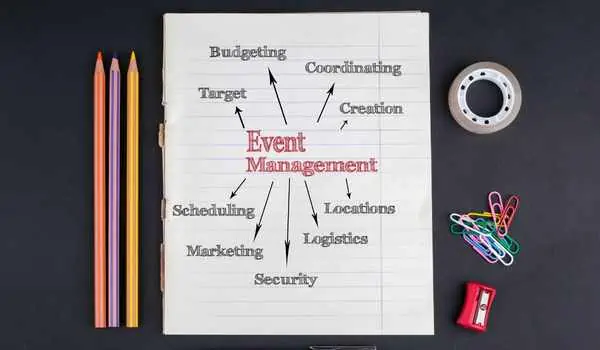What does an event manager do?
For an event to be a success and achieve its goals it needs to be managed well. With so many aspects to think about when planning and running an event, using an event manager can help to take the pressure off and ensure your event runs smoothly. But what exactly does an event manager do? We discuss some of the main duties of an event manager and outline some of the benefits hiring one to help run your event has.
What is an event manager?
An event manager is someone who oversees the running of the whole event. They manage the planning, design, set up and execution of the event as well as overseeing and organising the staff.
Event managers can be used to run all kinds of events. From small networking meetings with only a dozen attendees to large-scale music festivals with thousands of visitors, an event manager is the key to running a successful event. An event manager is usually in charge of an event management company that is made up of lots of skilled individuals that specialise in different areas of the event to help the whole event run smoothly.


An event manager’s main duties
There are several duties that the event manager takes care of to ensure an event is a success. The first is the pre-event planning. After the event concept has been agreed, the event manager sets to plan the event.
Event planning includes many areas including researching and hiring the correct venue, finalising dates, procuring all suppliers and supplies, hiring staff and creating a detailed budget and timeline to work from. This planning stage is very important to ensure that the event’s main goals and objectives are met and that the event doesn't go over budget.
Liaising with creatives & staff
The event manager will work alongside a team of marketing experts to help deliver on the event's marketing goals. Another key duty of an event manager is ensuring that everything on the day of the event runs smoothly. The event delivery is crucial to ensure it delivers on the attendees' expectations. Event managers also need to make sure all the event staff are in the right place at the right time and are doing their jobs correctly. The duties of an event manager don’t stop when the event is over. It is within the event manager’s remit to support the marketing team to deliver post-event communications and any post event follow-ups that have been planned. Well executed marketing operations for events encourage visitors to attend again and tell others about their positive experience.

Why hiring an event manager is worthwhile
Many small businesses can operate events on their own, but using an experienced event manager has many benefits.
- Reduce the pressure: An experienced event manager does events day in and out. For the less experienced, organising an event can feel a little overwhelming. One of the main reasons people hire an event manager is so they can take on the more stressful tasks, leaving you with fewer worries.
- Seamless event delivery. Another advantage of using an event manager is that they help to make sure the event runs smoothly. If there is an issue that arises, the event manager will normally have lots of experience to draw upon to fix this and help to make sure that it has a minimal impact. Experienced event managers will plan everything to the letter to avoid any problems. They will then be on hand, and have the capacity, to deal with curve balls and emergencies.
- Contacts: Experienced event managers have worked with numerous different suppliers including entertainers, caterers, infrastructure providers and staff, so they can help you choose the best one for your specific event.
In summary
Are you looking to host your first event? Or are you looking to scale up an existing event and make it bigger or better. If so, you're in the right place. Contact our experienced team of experts for a no obligation chat - we'd love to hear from you and see how we can help support you build a world class event.




